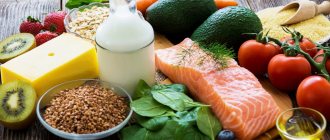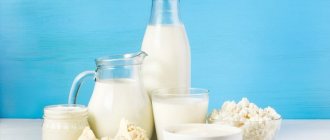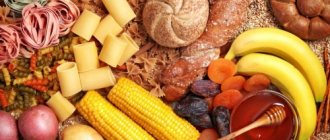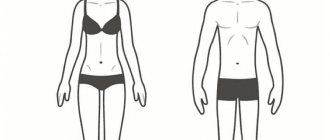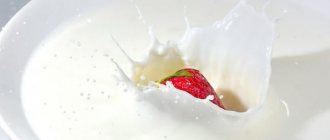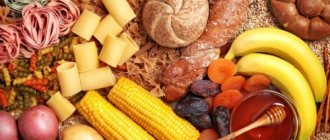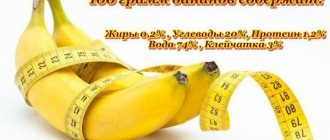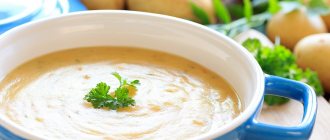Proper nutrition for an athlete is as important as regular training. The food you eat affects muscle growth, post-workout recovery, and overall health of the body.
In this material we will talk in detail about all the nuances of sports nutrition. You will learn what is its fundamental difference from regular nutrition, what foods you need to eat and which should be excluded from your diet. You will also find standard menus for different purposes and learn about the importance of balancing proteins, fats and carbohydrates.
Basic concepts and principles, how it differs from regular nutrition
Any professional athlete will tell you that without proper nutrition it is almost impossible to achieve high results. There is logic in this - during training, the body spends a huge amount of energy, which must be replenished, including through food. The correct balance of vitamins and microelements helps the body recover faster after exercise.
Any sports diet includes a preliminary calculation of BZHU - proteins, fats and carbohydrates. Different diet goals imply different ratios of dietary fatty acids in the foods consumed. There are three main requirements that sports nutrition must meet:
- Enriching the body with vitamins and microelements;
- Normalization of exchange processes;
- Normalization and subsequent maintenance of body weight.
Preparing a diet begins with calculating the dietary supplements needed by the body. Products and meals are selected in such a way that the athlete receives the required amount of calories. WHO standards for the BJU ratio: 1:1:4.
If the goal is to lose weight, the amount of protein is kept to a minimum. If a person wants to gain muscle mass, then proteins in food should prevail. The World Health Organization has derived and presented the basic principles on which an athlete’s diet is based:
- 300-500 grams of vegetables and fruits every day;
- Since fruits are quickly digested, it is best to consume them 30-60 minutes before the main meal;
- It is not recommended to eat fried foods. The omega-3,6,9 contained in it is transformed into toxic substances;
- Do not overuse salt and sugar, maximum 10% of the daily value;
- In the first half of the day, it is necessary to focus on the consumption of complex carbohydrates and foods saturated with fats;
- The last meal is no later than 3 hours before bedtime;
- Root vegetables with high starch content
T3 supplements
T3 (triiodothyronine) is a hormone produced by the thyroid gland. T3 has a very powerful effect on a person's metabolism and ability to burn fat. Simply put, the more free T3 you have, the more fat you will burn. Hypothyroidism is now very common. With this diagnosis, people are not able to produce enough of this hormone. This problem is especially common in women.
Many bodybuilders take thyroid medications, such as Cytomel, to take advantage of the fat-burning benefits. This way they increase their T3 levels and get a very lean body.
The body naturally produces about 25 mcg of T3 each day, however, if your levels are significantly below this, your doctor may prescribe exogenous T3 (Cytomel). Mr. Olympia and bodybuilding legend Lee Priest has admitted to taking T3 drugs in the past. Specifically, he consumed 25-50 mcg of Cytomel per day before the competition.
The main disadvantage of using T3 drugs is that they can suppress the natural production of this hormone, as do steroids, for example. Thus, immediately after using T3, you may have difficulty burning fat. However, endogenous T3 production should recover after several weeks or months of use.
However, low T3 levels are possible in the long term if a bodybuilder abuses the drug and does not give the body a break from it. In this case, a deficiency of the hormone can slow down fat loss, even if the person is on a low-calorie diet.
Which products should be more common and contain which substances?
The three main components should be found in products in the following proportions:
- Proteins – about 30-35%;
- Fats – about 10-20%;
- Carbohydrates – about 50-60%;
The menu is compiled individually, depending on gender, age, health, and physical fitness.
Squirrels
An athlete's menu must include foods containing proteins: slowly and quickly digestible. They consist of amino acids, proteins and peptides that strengthen and catalyze the growth of muscle tissue.
Daily protein intake should be in the range of 10-25 grams per 10 kg of body weight. For an average person weighing 75 kilograms, 150 grams of protein per day will be enough.
If the athlete’s goal is to gain weight, you need to increase the amount of protein consumed by switching to a special protein diet, or simply changing the diet with the addition of protein dishes.
Fats
A balanced diet should include healthy fats. The body spends them during cardio training - monotonous activities at a low pace. Fats also act as a temperature regulator in the body and support the functioning of internal organs.
Fats are divided into two types: vegetable and animal. It is important that both are present in the diet. There should be 1-2 grams of fat per kilogram of weight.
Carbohydrates
Biologically active substances that are the main metabolic processes in the body. Carbohydrates are responsible for energy and recovery. A proper diet should include both simple and complex carbohydrates.
For 1 kilogram of your own weight per day you need to consume from 5 to 10 g of carbohydrates. On average, a person weighing 80 kg will consume about 60-70 grams. It is recommended to consume complex carbohydrates in the first half of the day, before 14:00.
The process of breaking down starch in the body provides us with glucose, which is directly related to the replenishment of energy and vitality. Starch is a good source of complex carbohydrates. By eating carbohydrates at breakfast, you will be full of energy for the whole day. It is for this reason that you should not skip breakfast.
Proper nutrition for athletes: a complete diet for a week
Regular training, alternating load and recovery is a condition necessary for progress in sports, but in itself is not sufficient.
In addition to the training program and eight hours of sleep, you need to eat right. The importance of a balanced diet for an athlete is difficult to overestimate. If you have recently joined the gym and are just starting to train, then at first the relationship between progress and nutrition is not obvious. But if you work out 3-4 times a week or more, you can't eat the same way you ate when the hardest physical activity was climbing the stairs to the second floor.
Why should the diet also change as the load increases? The body's need for nutrients increases. For example, with any physical activity, the body’s consumption of iron increases, so there should be more of this microelement in the diet. If you do not take into account the changing needs of the body, your immune system will weaken, your progress will slow down, at best, you will often catch colds and feel slightly unwell, at worst, your internal organs will suffer.
Products for a healthy diet
You'll have to sacrifice some of your favorite treats if you want to get your body in good physical shape. Below is a list of products that are recommended for consumption:
- Poultry: chicken, turkey. It contains a lot of proteins and vitamins;
- Cereals, oatmeal. Contains fiber, vitamins and minerals;
- Red sea fish. Contains omega-3 fatty acids necessary for the body, accelerates metabolic processes;
- Beef is a source of BJU;
- Buckwheat grain. Rich in starch, a complex carbohydrate that provides the body with energy;
- Chicken eggs - rich in zinc, iron, protein;
- Clean drinking water. It is necessary to drink at least two liters a day for the body to work at full strength;
- Fruits and vegetables are sources of vitamins and microelements;
- Low-fat yoghurts, sour cream, kefir, cheeses;
Recommendations for proper and healthy food
There are many successful and famous athletes whose knowledge of healthy eating is reflected in their athletic success. Having extensive training experience, they willingly share advice with novice athletes.
Bodybuilder Helmut Strebl
Helmut Strebl, a famous bodybuilder, model and trainer, advises adhering to the following principles in sports nutrition:
- 5-6 meals a day;
- low fat content in the diet;
- only complex carbohydrates.
An approximate diet of proper nutrition by G. Strebl for every day when playing sports is presented in the table with the menu. It contains foods and supplements for each of the 6 meals.
| 1 | 2 | 3 | 4 | 5 | 6 |
| 1-7 egg whites, 1 yolk, chicken breast, coffee, jam. | Shake: 80 grams of carbohydrates and 50 grams of protein. | Brown rice, chicken/turkey. | Brown rice, chicken, fish/turkey. | Brown rice, chicken, fish/turkey. | 10 grams of protein, 3 pieces of whole wheat toast. |
Important! Before following the presented sports diet, you should consult a doctor, since such a strict sports regimen and intense training can significantly harm your health.
Fitness model Alice Matos
Famous Brazilian fitness model, athlete and social media star, Alice Matos follows the principle of eating five meals a day. Its approximate menu is given in the table.
| 1 | 2 | 3 | 4 | 5 |
| Egg whites, low-fat milk, oatmeal. | Steamed chicken breast, wild rice, vegetables. | Protein cocktail. | Baked fish, vegetables. | 5 egg whites. |
The model advises eating no later than 7 pm and making sure there are enough vitamins and minerals in your diet.
Fighter Fedor Emelianenko
The famous Russian wrestler, Fedor Emelianenko, has a special opinion on how to eat properly when playing sports. He believes that an athlete should eat regular foods and maintain a normal, sensible diet.
The wrestler does not consider it necessary to use special cocktails and mixtures. The only supplements he introduces into the diet are vitamin and mineral complexes. In his opinion, everyone can determine for themselves how to eat properly when playing sports.
What happens if you don't stick to your diet?
Many people do not think about their diet at all, but poor nutrition can lead to sad consequences for the body. Moreover, poor nutrition means not just the consumption of fast food, but also large portions, lack of vitamins, and incorrect balance of nutritional supplements. What can poor nutrition lead to:
- Deep-fried foods contain many carcinogens. This can lead to the development of cancer;
- Excess salt and spices in foods gives them taste, but does not benefit the body. The risk of developing hypertension, kidney disease, and joint problems increases;
- An incorrect ratio of BZHU leads to a lack of minerals and nutrients in the body. You will feel hungry much more often than if you were eating healthy;
- Trans fats contained in foods negatively affect immunity and reproductive function. Trans fats include margarines and various spreads;
- Improper nutrition leads to obesity, stomach and intestinal diseases.
Is calorie content important when choosing healthy foods?
When playing sports, you need to consider your calorie expenditure. Insufficient calories lead to exhaustion of the body, while too many calories contribute to the gain of fat mass. When compiling calorie intake, the following factors should be taken into account:
- body mass;
- kind of sport;
- level of physical activity;
- age;
- floor.
Important! It is necessary to increase the caloric content of the diet mainly through protein dishes.
When selecting sports nutrition, it is necessary to focus on the athlete’s well-being, fluctuations in his weight and the ratio of muscle to fat in the body.
You may also be interested in: Calorie consumption during physical activity: tables and calculations
What should the menu include?
Let's look at several basic menus for different types of people, depending on their goals. Each menu, depending on the purpose, has its own balance of food products and includes different products.
Sports menu
The optimal ratio of BZHU for an athlete:
- 30% – proteins;
- 60% – carbohydrates;
- 10% – fats.
A person involved in sports should consume about 2500-2700 kilocalories per day.
Products that will make up the athlete’s diet:
- Cereals;
- Skim cheese;
- Cereal porridge;
- Fruits and vegetables;
- Poultry meat;
- Bread;
It is better not to overuse salt and sugar, use olive oil when frying, and eat vegetables either fresh or steamed and stewed. It is better to eat fractionally, in small portions 4-5 times a day. You can eat fruits and dairy products as snacks.
Menu for a strength athlete
The main goal of such a menu will be to build muscle mass. To do this, you need to consume not only protein products, but also biologically active components - sports nutrition supplements.
Sample menu for the day:
- For breakfast you can eat a protein shake, rice with steamed vegetables and bread;
- Snack – protein bar, green tea;
- Lunch – baked potatoes with cheese, beef stew, vegetable salad;
- Pre-workout snack – protein shake, protein bar;
- Dinner – stewed meat or fish, buckwheat, rice, herbal tea, avocado;
- Late dinner – oatmeal, fresh orange juice.
Menu for cutting or losing weight
Diet for athletes is not only a way to gain weight, but also to lose weight. Products that are best consumed in this case:
- Sea fish;
- Chicken breast;
- Skim cheese;
- Rice;
- Grapefruit;
- Porridge on the water;
- Cauliflower or broccoli;
- Omelette;
- Boiled eggs.
Playing sports involves a lot of stress on the body, especially for high-class athletes. Among the hygiene measures for sports activities, nutrition is of great importance. Rational nutrition increases athletic performance and facilitates adaptation to physical and nervous stress.
The importance of nutrition in modern sports is studied from the point of view of the role of nutrients in ensuring physical performance and endurance, as well as rehabilitation of the body after heavy physical exertion.
Sports and regular physical education are fundamentally different in the intensity and severity of the physical work performed. The goal of sport is to achieve maximum results at any cost. The task of physical education as a factor in a healthy lifestyle is to maintain good physical shape and maintain a person’s physical and mental health.
Rational nutrition of athletes allows you to: satisfy the increased need for energy and nutrients and provide conditions for achieving maximum sports results; prevent specific and nonspecific damage to muscle tissue and other organs and systems caused by stressors of heavy and intense physical activity; delay and prevent the onset of feelings of fatigue; to ensure rehabilitation of muscular and other body systems from damage caused by exposure to heavy physical activity and neuro-emotional stress after competitive loads.
Basic principles of rational nutrition for athletes:
- proper chemical composition and energy value of diets - a sufficient amount of nutrients and energy necessary for the body, taking into account age, gender, type of sport, volume of sports loads, climatic factors, etc. (Table 8.17);
- balance of nutrients in the diet, i.e. a certain ratio between them in relation to the sports that athletes engage in;
- the use of individual nutrients to stimulate metabolic processes and functions of those organs and systems that are especially important for performing specific sports activities;
- selection of food products that meet the needs of the body for the period of intense training, competitions and during the recovery period after competitions;
- introduction into the diet of foods that are quickly digested in the digestive tract, which, if sufficiently satiated, do not burden the digestive system;
- variety of food due to a wide range of products;
- the use of nutritional factors to increase the rate of muscle gain and strength, as well as decrease body weight, taking into account the weight category of athletes;
- choosing the right diet;
- individualization of nutrition for athletes, taking into account national traditions and personal habits.
The nutritional needs of athletes are determined by three main factors: increased energy consumption, significant losses of electrolytes (minerals, salts) through sweat, and the need to increase the mass of tissue (primarily muscle) proteins.
Table 8.17.
Daily requirement of athletes for nutrients and energy depending on the type of sport
The calorie content of athletes' daily diets must be reduced 2 weeks before the competition, since during this period the magnitude of the training loads decreases. If energy intake remains the same, unwanted weight gain may occur.
A well-planned walkie-talkie satisfies the vitamin and mineral needs of athletes. To guarantee the prevention of the development of deficiency conditions, it is recommended to use vitamin and mineral supplements in a dose approximately equal to the daily micronutrient requirement of an adult. Particular attention is paid to the body's supply of iron and calcium in order to prevent anemia and osteoporosis in women.
During physical activity, the body loses electrolytes through sweat; these losses must be compensated with food. Fluid loss through sweat can increase the need for athletes to drink up to 6-7 dm3/eut. During a period of long training load, athletes are recommended to consume 0.5-1.0 dm3 of fluid every hour. Before competition, athletes should drink more than their thirst tells them. Water balance during this period is controlled by weighing in the morning. Particular importance is attached to water balance during competitions, since water loss through sweat disrupts the athlete’s performance.
Athletes combine drinking with the consumption of carbohydrates in drinks to maintain blood glucose levels. In warm weather, you should drink 0.5-1.0 dm3/h from the start of the competition. It is better to do this in small doses: 100-200 dm3 every 10-15 minutes. In long-term martial arts (throwing, jumping), a fluid intake of 300-600 cm3/h is sufficient.
A very important stage in the rehabilitation of an athlete after competition is rehydration, which involves the consumption of liquid as part of carbohydrate-containing drinks in order to restore the muscle glycogen depot.
The diet of athletes can be based on ordinary available food products; it should not violate the basic rules and principles of healthy eating. At the same time, without the use of specialized sports nutrition products and drinks, as well as dietary supplements, not only elite sports, but also the achievement of tangible results by amateur athletes is currently impossible.
The increased need of athletes for proteins is explained by the need to develop muscles with the formation of new muscle cells, as well as to compensate for the loss of amino acids and other nitrogenous substances during heavy sweating. Proteins increase the excitability of the central nervous system and motor activity of the body.
Athletes' need for proteins increases in accordance with the increase in their need for energy, determined by the intensity and severity of physical activity (type of sport), and amounts to 1-1.5 g/kg body weight. This need is satisfied through a diet in which 12-15% of energy is provided by animal protein. In athletes with low energy expenditure (1600-2200 kcal/day), to ensure protein intake in the amount of 1-1.5 g/kg body weight, protein should be 15-20% of the total caloric intake of the diet. At very high energy costs, exceeding 4000 kcal/day, the need for protein will be satisfied if about 10% of the calorie intake is replenished from protein.
Excessive consumption of protein-containing foods may reduce the ability to withstand exercise, such as swimming. Consequently, both deficiency and excess of proteins in the diet are unfavorable for the body of athletes.
When choosing sports nutrition diets, it is very important to take into account not only the quantity, but also the quality of proteins. To satisfy the body's need for amino acids, it is necessary to include in the diet combined food products with such a combination of animal and plant materials that ensures a balanced amino acid composition.
To increase the protein value of food products, the domestic industry produces milk-fortified bakery and pasta products, as well as dairy products with a high protein content (4.5%): Tallinn kefir, protein milk, yogurt, etc. Cereals containing up to 16-21% proteins with a balanced amino acid composition – “Strong”, “Sports”.
Specialized products have been developed for athletes, which contain complete proteins, %: protein-glucose chocolate - 20, fortified milk marmalade "Record" - 13, sweet cookies "Olympus" - 37, salty cookies "Spartak".
Fat intake for athletes is recommended to be moderate and sometimes limited. This is due to the fact that during intense sports loads, in particular strength and speed, the actual oxygen consumption is less than the body’s need for it. Oxygen deficiency in the body leads to incomplete oxidation of fats, as a result of which their breakdown products accumulate in the blood. In addition, a significant intake of fats from food while consuming carbohydrate reserves (glycogen) in the liver can cause temporary obesity. You need to reduce your fat intake during competitions and training in mountainous areas where there is not enough oxygen in the air. However, fats are the most energy-dense nutrients, which are sources of essential fatty acids, fat-soluble vitamins and lecithin. Through the consumption of fats, it is recommended to provide about 25-30%, but not less than 20% of the total calorie content of the athlete’s daily diet. Two thirds of fats should be unsaturated fatty acids.
In the nutrition of athletes, it is advisable to use medium-fat sandwich and dietary butter (spreads), which contain 60-62% milk fats and about 5% proteins.
Carbohydrates are the most beneficial source of energy for muscle work, since they are able to oxidize in the body both in the presence of oxygen and in its absence. The high need of athletes for carbohydrates is due to the need to create a glycogen depot, as well as for rapid recovery after training and competitions. All sports associated with speed, strength and other high-intensity exercises, as well as prolonged sports activities, are accompanied by the appearance of “working hypoxia” - a temporary oxygen deficiency in the body. During “working hypoxia,” carbohydrates are predominantly used as an energy source.
For endurance sports, carbohydrate intake should be 60% of the total caloric intake or 6-8 g/kg body weight, and for athletes of other sports - 55% or 5-6 g/kg body weight.
As sources of carbohydrates, athletes can consume regular performance-stimulating chocolate, honey, other foods and special nutritional mixtures, the bulk of which are easily digestible carbohydrates. However, the nutrition of athletes should not be based only on easily digestible carbohydrates; it is most advisable to supply carbohydrates in various combinations, for example, starch, regular sugar and glucose.
Vitamin deficiency in the body of athletes often occurs latently and manifests itself after severe physical stress with a decrease in muscle strength, rapid fatigue and other symptoms similar to those that arise in sports practice during overtraining. The amount of vitamins in athletes’ diets can be calculated for every 1000 kcal, taking into account the daily energy requirement. This calculation will ensure a balanced intake of vitamins.
For every 1000 kcal of athletes' diet, it is recommended: 35 mg of vitamin C; 0.7 mg thiamine (B1); 0.8 mg riboflavin (B2); 7 mg niacin (RR). The daily requirement for retinol is 2 mg per 3000 kcal of the diet, followed by the addition of 0.5 mg for every 1000 kcal, but in total no more than 4 mg/day.
Providing athletes with vitamins depends on the intensity of physical activity. During periods of particularly intense training and competition, the use of increased doses is recommended; to improve performance, occasional use of large doses is recommended. So, during the main training period it is recommended to take 100-150 mg of vitamin C per day, and during competitions - 250-300 mg. Immediately before the start, athletes are given 150-200 mg of vitamin C, depending on the duration of the load, and for 2-4 days. after competitions - 250-300 mg. This increases athletic performance and accelerates recovery processes in the body. The combination of vitamins C and P enhances their effect on the body.
Thiamine (vitamin B1) is prescribed on training days at 3-5 mg/day. (depending on the duration of classes), during competitions – 5-10 mg/day. A single dose of thiamine, unlike ascorbic acid, does not stimulate physical performance, so thiamine is taken within a week before the competition.
It has been proven that athletes’ performance increases when they are prescribed up to 30 mg of niacin (vitamin PP) and 5 mg of pyridoxine (B6) per day during particularly intense training sessions and competitions. To normalize the metabolism of vitamin A in the body under such conditions, it is recommended to take an additional dose of 1-2 mg, so that the daily intake of this vitamin is 3.5-4 mg.
Taking vitamin E 100-300 mg/day has a positive effect on physical performance during intense physical activity. for adults and 50-100 mg/day for young athletes (depending on the duration of training).
An increase in the content of vitamins in the diet of athletes should be ensured, first of all, through food products in which vitamins are optimally combined with each other and with other nutrients. It is advisable to use industrially produced food products enriched with micronutrients, multivitamins and dietary supplements. We must not forget that uncontrolled intake of large doses of vitamins can negatively affect the body. Thus, vitamin E in moderate doses improves muscle activity and endurance of athletes, and in large doses it reduces appetite and impairs sleep.
Intense physical work increases tissue oxygen consumption by 10-15 times compared to rest. Increased oxygen consumption is a risk factor for the development of “oxidative stress,” leading to the generation of oxygen free radicals and the induction of lipid peroxidation (LPO). Most studies do not directly measure free radicals in muscle, but rather evaluate effects induced by free radicals, such as the formation of secondary lipid peroxidation products. The effect of physical activity on the formation of lipid peroxidation products in untrained people is especially pronounced.
The body has antioxidant enzyme and non-enzyme systems that capture and neutralize free radicals and lipid peroxidation products. With increasing training, the activity of antioxidant enzymes increases and the amount of lipid peroxidation products formed decreases in response to intense physical activity.
The main role in the antioxidant defense system is played by nutritional factors - vitamins E and C, β-carotene, selenium. Increased intake of antioxidant vitamins reduces the formation of lipid peroxidation products, but does not completely stop it during physical activity. Under the influence of antioxidant vitamins, damage to muscle cells by oxidative stress products is significantly reduced, and muscles recover more effectively after exercise. However, additional intake of antioxidant vitamins does not improve athletic performance compared to the body’s normal supply of these nutritional factors.
When playing sports, the need for certain minerals increases. Thus, the daily need for calcium reaches 1200 mg, phosphorus - 2000 mg, potassium and sodium increases by 20-25%. With normal nutrition, the need for these minerals is, mg/day: calcium - 800, phosphorus - 1200, potassium - 3000, sodium - 4000.
The need to increase the amount of calcium in the diet of athletes is associated with a decrease in its content in the blood during intense physical activity, which, in turn, negatively affects the state of the nervous and muscular systems. The increased need for potassium and sodium is due to their loss through sweat. A deficiency of these substances in the body leads to muscle weakness, lethargy, drowsiness, apathy, loss of appetite, and decreased blood pressure.
Iron plays an important role in the nutrition of athletes. It is part of the enzymes that ensure tissue respiration, as well as myoglobin, which is a reservoir of oxygen in the muscles. With iron deficiency in the body, cellular respiration is disrupted, and the ability of the blood to deliver oxygen to tissues is reduced.
The nutrient needs of young athletes are different from those of adult athletes. Currently, there are no uniform nutritional standards for young athletes. It is known that the supply of nutrients to children and adolescents should be higher than that of adults. This is due to their growth and greater mobility. Young athletes during active training need to increase the energy value of their diet by approximately 25-30%.
Thus, for children 11-13 years old involved in gymnastics, it is recommended to include in the daily menu, g: proteins - 99 for girls and 114 for boys; fat – 83 for girls and 95 for boys; carbohydrates – 430 for girls and 450 for boys. The daily diet of girls and boys aged 11-13 years who go in for swimming should include, respectively, 112 and 147 proteins, 112 and 122 fats, 430 and 450 carbohydrates.
Young athletes have an increased need for vitamins. For girls and boys aged 11-13 years and girls and boys aged 14-17 years, the following norms for vitamin consumption, mg/day, have been developed: vitamin C - 100 and 110, riboflavin (B2) - 2.9 and 3.5, niacin (RR ) – 30 and 35, respectively. During competitions, additional intake of these vitamins is necessary.
Compared to adults, children need an increased amount of calcium. The ratio of calcium and phosphorus in the diet should be 1: 1. The need for iron, especially during competitions, is equal to the daily requirement of adult athletes and is 20 mg/day.
It is almost impossible to meet the nutrient needs of young and adult athletes through regular nutrition, so specially designed nutrition systems are used during the training cycle. Special diets for athletes include not only regular foods, but also fortified foods and dietary supplements, which make it possible to compensate for the relative deficiency of any substrates and biologically active substances necessary for the body. Sports nutrition products created using various functional ingredients are an important link in the correction of an athlete’s nutrition and contribute to the adaptation of his body to high physical activity (Table 8.18).
Table 8.18.
Functional food ingredients for athletes
An important part of the diet of athletes is water, which ensures the course of metabolic reactions in the body, thermoregulation, excretion of metabolic products in the urine, etc. During normal training (combining sports with professional work), the need for water is 2.5-3 dm3 /day, and during intense training and competitions - 3.5-5 dm3 or more, taking into account the air temperature, severity and duration of the load. For example, during a tense match, hockey players sweat up to 1-2 dm3. During cross-country skiing, sweating and evaporation increase sharply even at low air temperatures.
A whole range of thirst-quenching drinks has been developed especially for athletes. Low-fat fermented milk drinks and whey are recommended. Carbonated drinks containing organic acids, a complex of minerals, glucose or xylitol, vitamins, and berry extracts better quench your thirst; The sugar content should not exceed 0.5-1.5%. Powdered drinks “Victoria” and “Olympia” have become widespread in the drinking regime of athletes. They are used in sports that require endurance: during road cycling, race walking, etc. Methods of using drinks may vary: at distances during competitions, 200 g of a powdered sports drink is dissolved in 1 dm3 of warm boiled water and drunk in portions of 1/2 3-2/3 cups; after long workouts, dissolve 200 g of the powdered drink in 2 dm3 of warm boiled water and drink 1-2 cups.
For athletes of team sports (hockey, football, basketball, etc.) con, “Citrus”, “Vitaminized” have been developed. A 6-7% aqueous solution is prepared from them for drinking during and after physical activity.
Statistics show that about 50% of football players use carbohydrate-electrolyte drinks on game days. On rest days or after training, these drinks are used by about a third of athletes in team sports. Among nutritious carbohydrate-mineral drinks, “Sports Drink” is widely used, produced in the form of a powdered concentrate in 300 g cans. This portion is dissolved in 0.7 liters of warm water and drunk cool 1.5-2 hours before the start or at a distance of 0.5-1 stack. appointment.
Tea quenches thirst well, replenishes the body's need for water, tones the nervous system and improves performance, and green tea is better than black tea. Coffee quenches thirst worse and has a less favorable effect on the body during physical activity and high air temperatures. Strong coffee can reduce athletic performance. Non-alcoholic drinks (lemonade, kvass, Pepsi-Cola, etc.) are recommended to be consumed only after training or competitions. Oxygen cocktails are very useful after intense physical activity - oxygenated juices of fruits and berries, rosehip infusion. Cocktails can be enriched with vitamins, mineral salts, glucose, and citric acid.
At competitions, especially those that last for many hours, the developed nutrition menus are supplemented with special foods and drinks, vitamin preparations and dietary supplements. At distances, in particular skiing, carbohydrate nutritional mixtures are used, consisting of, for example: 50 g of sugar, 25 g of glucose, 50 g of fruit and berry juice, 20 g of oatmeal decoction, 0.3 g of ascorbic acid and 0.5 g of citric acid , 3 g sodium phosphate and 200 ml water from 50 g sugar, 50 g shukose, 40 g fruit juice, 0.5 g ascorbic acid, 1 g sodium chloride (table salt), 2 g sodium phosphate and 200 cm3 water .
A valuable addition to the nutrition of athletes in high-speed power sports is the drug for the rehabilitation of athletes "SP-11", containing 44% complete proteins, 37% easily digestible carbohydrates, 8% fats, vitamins, mineral salts, organic acids. It is used at 50-150 ricyr. before and after the competition.
Protein-glucose chocolate is used for long-term sports activities that require endurance (50 g 1.5-2 hours before the start and 50 g after the load). Sweet protein cookies "Olympus" and salty protein cookies "Spartak" are recommended at 50-200 g/day. in 3-4 doses during the recovery period after physical activity for weightlifters, wrestlers, boxers, gymnasts, fencers, runners and racers. It should be noted that some confectionery products unjustifiably bear “sports” names, since their composition does not meet the nutritional requirements for athletes: cookies and candies “Hockey”, “Dynamo”, “Sport”.
The organization of nutrition over a distance has characteristic features (marathon running, 50 km skiing, long-distance swims, etc.). For athletes involved in sports, it is imperative to timely replenish the body's energy resources, meet the need for water, vitamins, minerals, and maintain normal blood sugar concentrations.
Along the route, athletes receive specialized food products at certain intervals. Products must be ready for consumption, packaged in disposable paper or polymer cups. In bicycle racing, food is placed in thermoses attached to the bicycle frame.
Food products can be liquid or semi-liquid in consistency, the taste is pleasant, slightly sour. Such food eliminates thirst and does not cause discomfort, such as dry mouth. The composition and taste of products must be known to athletes in advance so that unfamiliar taste perceptions (sensations) do not distract them during competitions.
In organizing adequate nutrition for athletes, dietary supplements are of particular importance. Currently, such leading companies specializing in the production of sports products as Twinlab, Amerifit, Weider, Universal, and Multipowem are engaged in the production of dietary supplements for athletes. Each manufacturing company has its own approaches to the selection of dietary supplement components, based on scientific research (Table 8.19).
Table 8.19.
Characteristics of dietary supplement components for nutrition of athletes
In sports practice, medicinal plants are used as components of dietary supplements and specialized food products. First of all, these are Eleutherococcus, Leuzea, Chinese Schisandra, ginseng, Rhodiola, etc. For example, the seeds and fruits of Chinese Schisandra contain such functional ingredients as schisandrol, tannins, ephedrine, as well as an antioxidant complex with vitamin E. Including dietary supplements and products containing Chinese Schisandra extract have a stimulating and tonic effect, promote recovery after exercise, and reduce fatigue. A significant place in the diet of athletes is occupied by beekeeping products (apiproducts) - honey, pollen, beebread, royal jelly, propolis. The most useful property of honey is its ability to accelerate adaptation processes in the body and shorten the period of adaptation to heavy physical activity. Honey enhances tissues' ability to utilize oxygen and increases hemoglobin levels during intense training regimens. An important property of honey is its anti-inflammatory effect.
Physical performance is effectively increased by products containing pollen, including beebread. Such products are included in the diet of athletes to prevent overload, relieve fatigue, and prevent cardiac disorders (pollen improves the transport function of the blood - oxygen transfer).
Royal jelly is usually used in combination with other apiproducts. The most common preparations are “Apitonus” (contains 98% honey and 2% royal jelly) and “Apiphytotonus-1” (94% honey, 4% pollen and 2% royal jelly). Higher pollen content in “Apiphytotonus-2” (20%). "Apital" contains, along with royal jelly, ascorbic acid within the average daily human requirement.
Example of breakfast, lunch and dinner
Balanced sports nutrition: breakfast, lunch and dinner. You can eat three times a day or split your food into 5-6 meals. The last option is the most optimal if you want to lose weight.
Breakfast
Option 1: oatmeal with water, banana, walnuts, green tea;
Option 2: two boiled eggs, whole grain bread, tomato, smoothie;
Option 3: Omelette of two eggs with vegetables, kefir;
Dinner
Option 1: boiled beef with rice, vegetable salad, freshly squeezed juice;
Option 2: turkey with buckwheat, tomato, banana, glass of mineral water;
Option 3: chicken broth, steamed fish, sliced vegetables, green tea;
Dinner
Option 1: turkey with rice, cheese soup, water;
Option 2: steamed fish, vegetable salad, kefir;
Option 3: seafood with garnish, vegetable broth, freshly squeezed juice.
What an athlete should not eat
Professional athletes have to give up some foods. Among them:
- Coffee. Many people drink cups of coffee, believing that it will give them energy and improve attention and concentration. Caffeine does provide energy, but only for a short period of time. After some time you will feel tired and exhausted. It is better to replace coffee with green tea;
- Sauces from stores. Ketchups, tartar, cheese and mustard sauces - all this is strictly prohibited. They contain many dyes, preservatives, sugar and other harmful substances;
- Salt and sugar are white death. Sugar can be replaced with natural honey, and salt with soy sauce, lemon juice or spices;
- Fast food contains dyes, preservatives, and carcinogens. It is not recommended to use it not only for athletes, but for everyone in general.
Dietary recommendations
Several useful recommendations that will help answer the question of how to eat properly for athletes.
- Create your own menu. There are many “magic” diets on the Internet, but none of them may be right for you. Study the necessary literature or consult a nutritionist;
To create your diet, you need to know your daily calorie intake. Here is a convenient calculator for calculation
- The standard distribution of BJU for professionals should be around 3:1:6;
- A sports diet should contain nutritious natural foods, without dyes or additives;
- Give preference to dark grains: brown rice, buckwheat;
- Use sports supplements with caution;
- Don't overeat or starve, there should be balance in food. You should feel full. Chew your food thoroughly while eating;
- During cutting and losing weight, the amount of calories consumed should be less than the amount received from food. Cardio exercise is a good way to lose weight. In a week of training at an average pace, you can lose about two kilograms;
